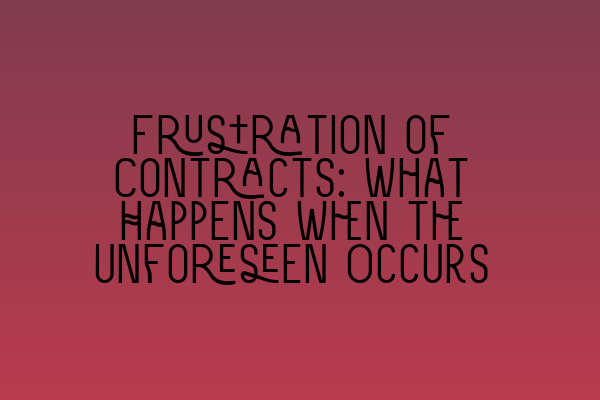Frustration of Contracts: What Happens When the Unforeseen Occurs
Contracts are an integral part of our daily lives, governing various transactions and agreements. However, sometimes unforeseen circumstances arise, making it impossible for parties to fulfill their contractual obligations. This is where the concept of frustration of contracts comes into play.
So, what exactly is frustration of contracts? Frustration occurs when an event, beyond the control of the parties involved, renders the contract impossible to perform. It is important to note that frustration is not the same as breach of contract, where one party fails to perform their obligations intentionally or negligently. Instead, frustration arises from unexpected events that make the contract impossible to fulfill.
Examples of Frustration
There are various situations that can lead to the frustration of a contract:
- Death or incapacity: If a party to a contract passes away or becomes incapacitated, the contract may become frustrated. For example, if a musician is contracted to perform at a concert but becomes ill and is unable to perform, the contract may be frustrated.
- Government intervention: In certain cases, government intervention can frustrate a contract. For instance, if a company is engaged in a construction project, and the government passes a law prohibiting such construction, the contract may be frustrated.
- Unexpected events: Natural disasters, war, and other unforeseen events can also lead to contract frustration. For instance, if a venue is destroyed by a fire before an event, the contract to hold the event at that venue may be frustrated.
Effects of Frustration
When a contract is frustrated, the parties are generally excused from their obligations, and the contract is deemed to come to an end. However, it is crucial to understand that frustration does not automatically discharge the parties from their obligations.
Instead, the Law Reform (Frustrated Contracts) Act 1943 provides a framework for determining the consequences of frustration. Under the Act, any money paid or property transferred before the frustrating event can be recovered, and any obligations that have been performed before the frustrating event are still valid.
Furthermore, the Act allows the court to apportion any expenses incurred by the parties and determine if any sums paid should be refunded or retained. The court may also order compensation to account for benefits received by the parties before the frustrating event occurred.
Contractual Frustration vs. Force Majeure Clauses
It is important to note the distinction between contractual frustration and force majeure clauses. A force majeure clause, commonly found in contracts, specifically addresses unforeseen events and outlines the consequences if such events occur. These clauses often specify the obligations of the parties in the event of unforeseen circumstances.
In contrast, contractual frustration applies in situations where the contract does not include a force majeure clause or if the event leading to frustration falls outside the scope of the clause. Contractual frustration is a common law doctrine that operates independently of any specific clause in the contract.
It is advisable to carefully review contracts and consider including force majeure clauses to address unforeseen events and avoid issues related to frustration of contracts.
Conclusion
Frustration of contracts can be a complex legal concept, and its application depends on the specific circumstances of each case. Parties should seek legal advice to determine if frustration applies and understand the consequences of frustration on their contractual obligations.
If you want to learn more about contract law and prepare for the SQE exams, check out our related articles:
- SQE 1 Practice Exam Questions
- SQE 1 Practice Mocks FLK1 FLK2
- SQE 2 Preparation Courses
- SQE 1 Preparation Courses
- SRA SQE Exam Dates
For expert guidance and comprehensive preparation, SQE Contract Law offers high-quality courses and resources to help you succeed in your legal career.
